
Everything You Need to Know About Water Cremation Legality in California
The Legal Status of Water Cremation in California: What You Need to Know
Is water cremation legal in California? Yes, water cremation (alkaline hydrolysis) has been legal in California since 2017 when Assembly Bill 967 was signed into law, though the regulations didn't take effect until July 1, 2020.
| Quick Facts: Water Cremation in California |
|---|
| ✅ Legal Status: Yes, legal since 2017 (effective 2020) |
| 📜 Governing Law: Assembly Bill 967 (AB 967) |
| 🏛️ Regulatory Body: Cemetery and Funeral Bureau |
| 🐾 Pet Aquamation: Legal in all 50 states, including California |
| 💰 Average Cost: Starting at $3,750 (vs. $1,000 for flame cremation) |
Water cremation, also known as aquamation or alkaline hydrolysis, offers an eco-friendly alternative to traditional flame-based cremation that's gaining popularity among environmentally conscious Californians. The process uses water, heat, pressure, and potassium hydroxide to gently reduce the body to bone fragments, using 90% less energy than traditional cremation while producing no greenhouse gases.
Unlike the common misconception that water cremation exists in a legal gray area, California has established clear regulations through AB 967, which amended both the Business and Professions Code and Health and Safety Code to explicitly recognize and regulate this method. Facilities offering this service must obtain specific licenses, meet strict equipment standards, and follow proper protocols for the disposal of both the resulting bone fragments and the sterile liquid byproduct.
I'm Mortuary Cooler, a national supplier of mortuary equipment with extensive experience helping funeral homes steer the regulatory requirements for implementing water cremation services in California. Having worked with numerous facilities to ensure proper compliance with is water cremation legal in California regulations, I understand the equipment and facility needs for this growing service option.
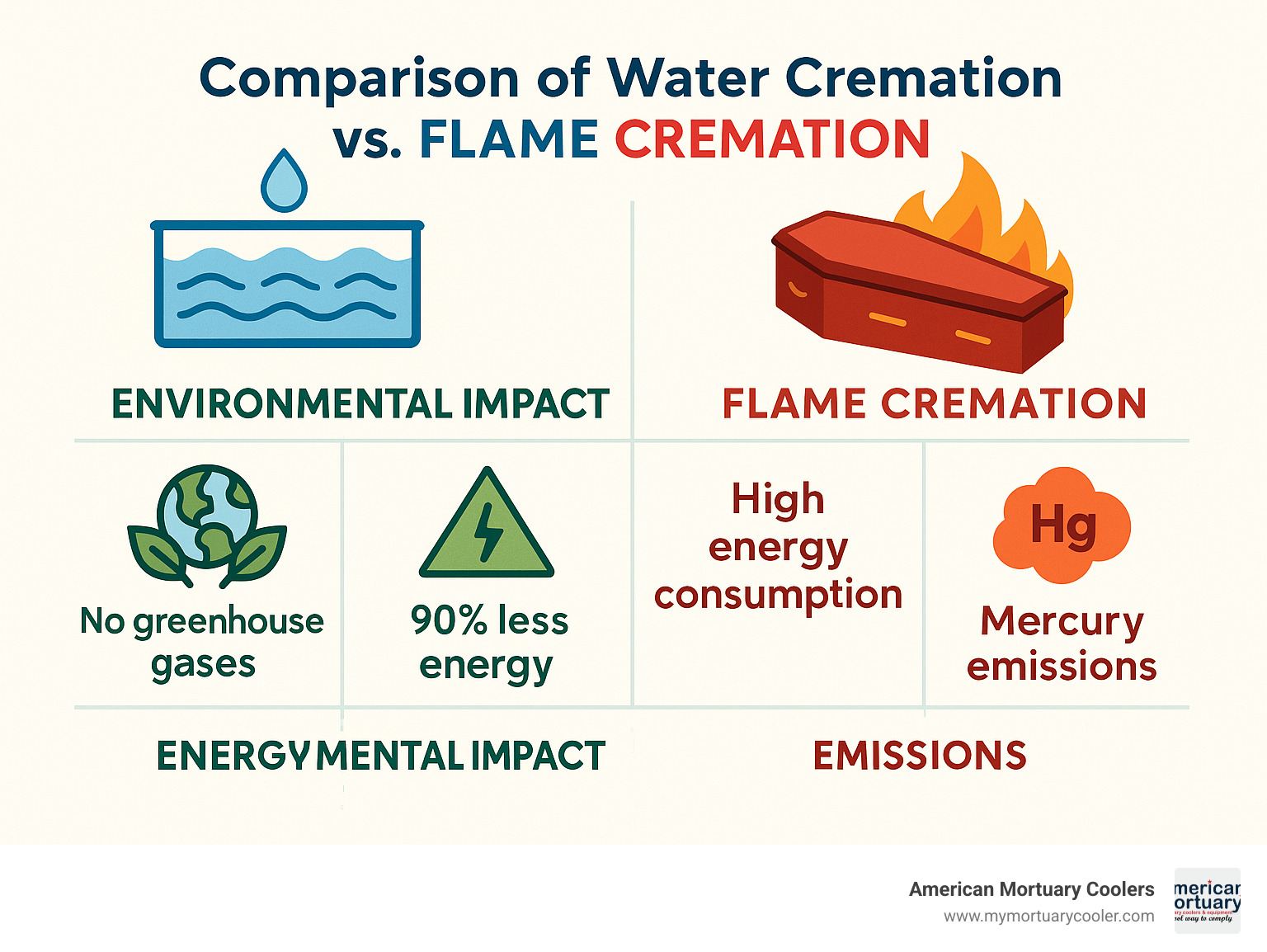
Learn more about is water cremation legal in california:
What Is Water Cremation (Aquamation) and How Does It Work?
Water cremation, scientifically known as alkaline hydrolysis, offers a gentle alternative to traditional flame cremation. Instead of fire, this process uses a combination of water, heat, pressure, and potassium hydroxide to break down the body in a way that mimics natural decomposition—just much faster.
Unlike flame cremation's intense 1,400°F temperatures, aquamation works at a more moderate 160°C (320°F). The warm alkaline solution gently dissolves the body's soft tissues, leaving only bone fragments behind along with a sterile liquid called hydrolysate.
"Think of it as natural decomposition in fast-forward," explains Dr. Samantha Wilson from the Green Burial Institute. "The same process that would take years in nature happens in just hours, all while maintaining complete dignity for the deceased."
The resulting "ashes" are actually 20-30% more plentiful than those from flame cremation, giving families more remains to memorialize their loved one. And because the process is so gentle, many families find comfort in choosing this option when asking "is water cremation legal in California?"
Going Out With a Splash: 5-Step Breakdown
The water cremation journey follows five main steps that transform the body with remarkable gentleness:
Body Preparation: The deceased is placed in a biodegradable silk bag and positioned carefully on the chamber tray. Unlike flame cremation, most medical implants including pacemakers can remain in place—a small but meaningful difference for many families.
Chamber Loading: Once prepared, the body enters a stainless steel vessel designed specifically for this purpose. These chambers blend dignity with technological efficiency, creating a respectful environment for the change.
The Hydrolysis Process: The sealed chamber fills with water and about 5% potassium hydroxide solution. Over 4-6 hours, the heated, pressurized environment works its magic, dissolving organic materials while preserving the bone structure.
Bone Processing: After the cycle completes, technicians carefully collect the remaining bone fragments. These are dried and processed into a fine, white powder using a cremulator—the same device used after flame cremation.
Hydrolysate Discharge: The liquid byproduct contains no DNA and is completely sterile. In California facilities, this liquid is cooled and released into municipal wastewater systems under proper permits, where it's treated alongside other biological materials.
"Many people are surprised when they first see aquamation equipment," says James Rodriguez from American Mortuary Coolers. "It looks more like a sophisticated pressure cooker than traditional cremation equipment—and that's exactly what makes it so energy-efficient and gentle."
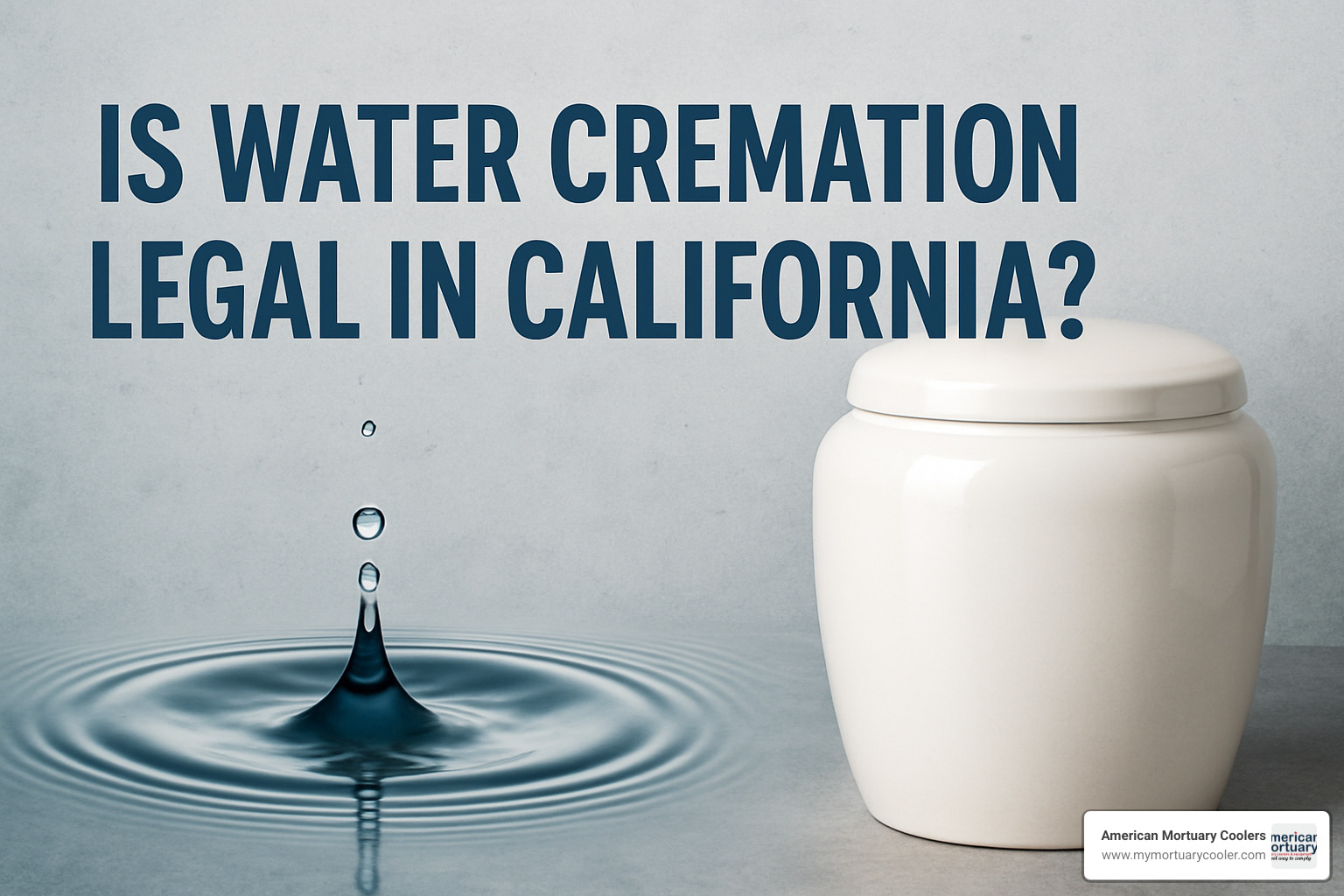
For those interested in learning more about this gentle process, our detailed guide Aqua Cremation Explained: A Water-Based Alternative covers everything from the science to the spiritual aspects. You can also find the step-by-step journey in our article Going Out With a Splash: How Water Cremation Works.
Is Water Cremation Legal in California?
Is water cremation legal in California? Absolutely! California officially acceptd this eco-friendly option when Governor Jerry Brown signed Assembly Bill 967 (AB 967) into law back in October 2017. Though the ink dried in 2017, the actual regulations didn't kick in until July 1, 2020 – giving the Cemetery and Funeral Bureau plenty of time to craft thoughtful regulations and develop proper licensing procedures.
The legislation amended Section 7611.9 of the California Business and Professions Code, along with several other sections across both the Business and Professional Code and the Health and Safety Code. These changes didn't just make water cremation legal – they gave it equal standing with traditional flame cremation as a legitimate method for handling human remains.
In the bill's language, hydrolysis is defined as "the reduction of human remains to bone fragments and essential elements in a licensed hydrolysis facility using heat, pressure, water, and base chemical agents." This clear definition helped establish water cremation as its own distinct category in California's end-of-life options.
As Assemblymember Todd Gloria, one of the bill's supporters, put it: "Californians are increasingly looking for end-of-life options that are both environmentally responsible and dignified. This legislation ensures that alkaline hydrolysis is properly regulated while giving families another choice."
When Did "Is Water Cremation Legal in California" Become a Yes?
The path to legalizing water cremation in California wasn't an overnight success:
- 2010-2011: Early legislative attempts to introduce alkaline hydrolysis stalled out.
- 2017: AB 967 successfully passed both houses and received the governor's signature on October 15.
- 2017-2020: The Cemetery and Funeral Bureau spent this time developing comprehensive regulations.
- July 1, 2020: The law became fully operative, and licensed facilities could legally begin offering water cremation.
This three-year implementation window wasn't wasted time – it allowed regulators to address environmental concerns, establish facility requirements, and create consumer protections. It also gave funeral service providers the opportunity to invest in equipment and train their staff properly.
Who Regulates and What Paperwork Do Facilities Need?
In California, the Cemetery and Funeral Bureau (part of the Department of Consumer Affairs) oversees water cremation facilities. If you're wondering about the paperwork involved, it's substantial but manageable:
Facilities need a Hydrolysis Facility License similar to crematory licenses but specific to water cremation. The application fee caps at $400, with possible additional investigation costs up to $900. Every piece of equipment requires Hydrolysis Chamber Approval to ensure it meets strict specifications for pressure, temperature, and pH levels, with sign-off from the State Department of Public Health.
Each facility must employ a licensed Hydrolysis Facility Manager who has passed an examination covering relevant laws and regulations. On the environmental front, facilities need permits from local wastewater treatment authorities, Certified Unified Program Agencies for hazardous materials handling, and sometimes the State Water Resources Control Board.
Regular maintenance doesn't escape regulation either – biologic indicator spore testing every five years and annual maintenance records are mandatory requirements.
"The regulatory framework for water cremation in California is thorough but navigable," explains Lisa Martinez, compliance officer at the California Funeral Directors Association. "It's designed to ensure both environmental safety and the dignified treatment of human remains."
Are There Limits or Restrictions on "Is Water Cremation Legal in California"?
While water cremation is legal in California, several important guidelines shape how it's implemented:
Local zoning ordinances may restrict hydrolysis facilities to industrial or commercial areas, so operators can't simply set up shop anywhere. The liquid byproduct (hydrolysate) must either be discharged to a municipal wastewater system with proper authorization or transported to an approved treatment facility – you can't just pour it anywhere.
Transparency matters too – facilities must disclose in writing whether viewing of the hydrolysis process is permitted, as some equipment designs don't accommodate this option. Only approved, biodegradable containers may be used, and facilities must clearly communicate this requirement to families.
Religious considerations also come into play. While legal status isn't affected, some religious authorities have expressed reservations about water cremation that might influence individual choices.
It's worth noting that pet aquamation is legal in all 50 states including California, though the regulations for pet remains are less stringent than those for humans. Many families find comfort in knowing they can choose the same disposition method for their beloved pets as they might for themselves.
These restrictions aren't meant to discourage water cremation but rather to ensure it's performed safely, ethically, and with proper environmental protections. As public awareness grows, more Californians are finding this gentle alternative that aligns with their environmental values.
Costs & Providers: Choosing Water Cremation in California
When families ask, "is water cremation legal in California?" and learn it is, their next question is often about cost. As of 2024, water cremation sits comfortably in the middle of the funeral price spectrum – more expensive than traditional flame cremation but considerably more affordable than conventional burial.
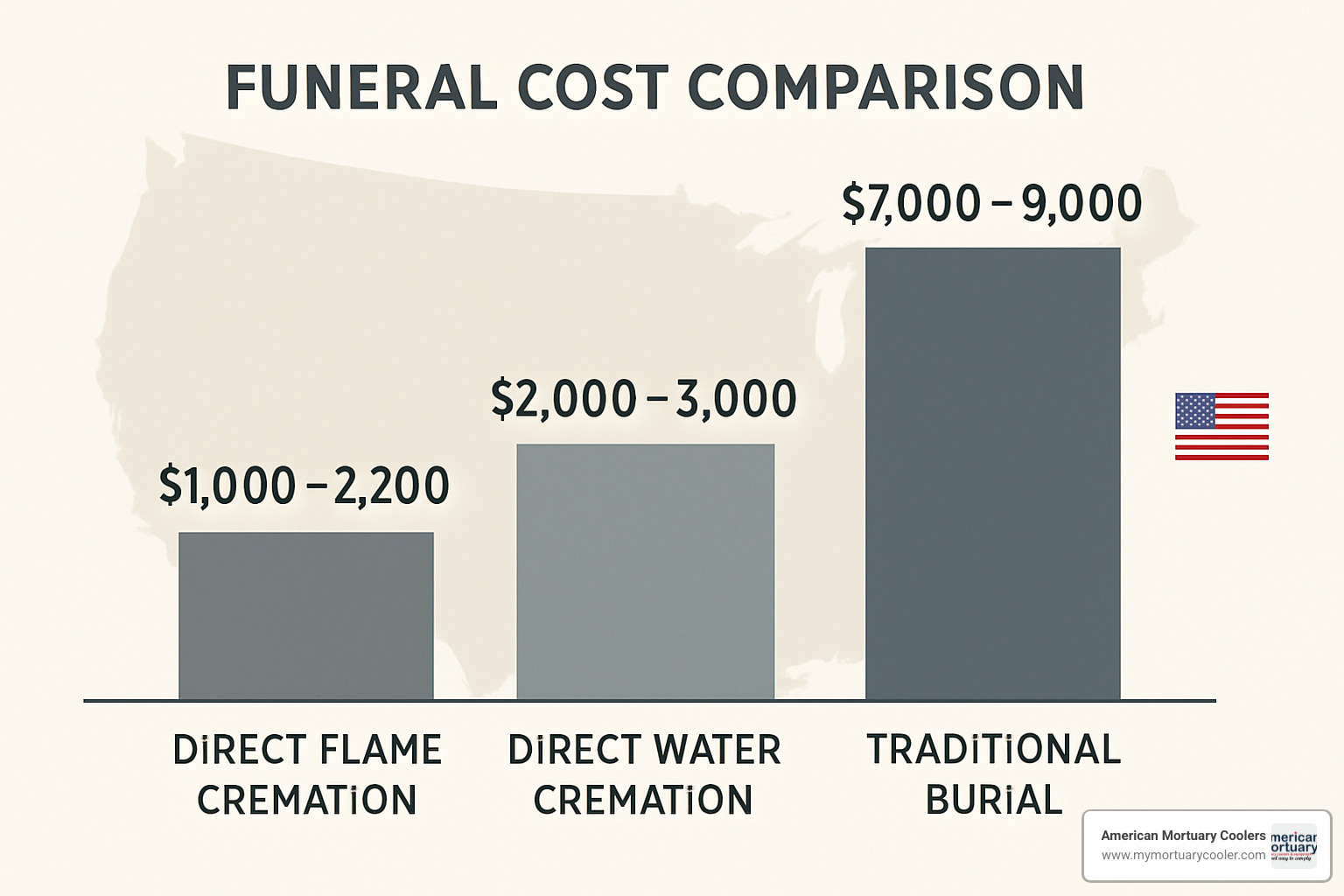
| Disposition Method | Starting Cost | Average Cost | Premium Options |
|---|---|---|---|
| Direct Flame Cremation | $800 | $1,000 | $2,500+ |
| Direct Water Cremation | $3,000 | $3,750 | $5,000+ |
| Traditional Burial | $7,000 | $9,000 | $20,000+ |
| Green Burial | $3,500 | $4,000 | $8,000+ |
You might wonder why water cremation carries a higher price tag than flame cremation. Several factors contribute to this difference. The equipment used is more sophisticated and expensive to maintain. The process itself takes longer – 4-6 hours compared to the 1-3 hours needed for flame cremation. With fewer providers currently offering the service, the limited availability also affects pricing. Plus, as a newer technology, water cremation hasn't yet benefited from the cost reductions that come with widespread adoption.
Typical Price vs Traditional Options
When comparing your end-of-life options in California, it helps to understand what you're getting at each price point.
A direct water cremation provides the essentials – transportation, the gentle hydrolysis process, and return of your loved one's remains in a simple container. In California, this typically starts around $3,750. For many families, this baseline service provides everything they need.
If you're looking for a more traditional experience, full-service water cremation packages include viewing opportunities, memorial ceremonies, and premium urns or keepsakes. These comprehensive packages range from $5,000 to $10,000, depending on your selections.
"While water cremation does cost more than flame cremation, we find that families who choose it are often motivated primarily by environmental concerns rather than cost," shares Eleanor Chen, a funeral director at Pacific Interment in San Francisco. "They see the additional cost as an investment in their values."
Many providers offer thoughtful add-ons that reflect the eco-friendly nature of water cremation. Memorial tree plantings, where cremated remains can nurture new life, biodegradable urns, and conservation donations are popular choices. These meaningful extras typically range from $200 to several thousand dollars.
Where to Find Licensed Providers
Since water cremation is legal in California, several forward-thinking funeral homes now offer this service across the state. If you're considering water cremation, these providers can help:
Pacific Interment in the San Francisco Bay Area was among the first to offer water cremation after legalization. They specialize in environmentally conscious funeral options and have extensive experience with the process.
For families in San Diego County, White Rose Aqua Cremation provides both human and pet aquamation services with a strong focus on sustainability and education.
Ethos serves the Sacramento area with a blend of traditional and modern disposition options, including water cremation. Their staff excels at helping families understand the environmental benefits of their choices.
Southern California residents can turn to Natural Grace, which specializes in green funeral options including water cremation alongside natural burial alternatives.
For our furry family members, Peaceful Pets Aquamation operates multiple locations throughout California dedicated exclusively to pet aquamation services.
The availability of water cremation continues to expand across California as more funeral homes invest in the necessary equipment and training. However, coverage remains more limited than traditional cremation, particularly in rural areas.
"We're seeing growing interest from funeral homes across California in adding water cremation to their service offerings," notes Michael Johnson of American Mortuary Coolers. "The initial investment is substantial, but many providers recognize that consumer demand for greener options is only increasing."
Is Water Cremation Legal in California for Pets Too?
Is water cremation legal in California for pets? Yes – and it actually has been legal for pets longer than for humans. Pet aquamation is permitted in all 50 states, including California, with significantly fewer regulatory problems than human aquamation.
Pet water cremation differs from human services in several important ways. The regulatory oversight is less stringent, as pet facilities don't require the same licensing from the Cemetery and Funeral Bureau. Many pet aquamation services operate in partnership with veterinary clinics, offering direct services when a beloved pet passes.
The pricing structure is also quite different. Pet aquamation typically costs between $150 and $500 depending on the animal's size and service options – substantially less than human aquamation. This affordability, combined with wider availability throughout California, has made water cremation increasingly popular among pet owners.
Pet parents often choose water cremation for the same environmental reasons that motivate human choices, along with appreciation for the gentler nature of the process. For many families, experiencing aquamation first through a pet's passing later influences their choices for human family members.
For more detailed information about costs, you might find our guide on A Comprehensive Guide to Water Cremation Costs helpful in planning ahead.
Environmental, Cultural & Religious Considerations
When families ask "is water cremation legal in California?", they're often driven by environmental concerns as much as legal ones. Water cremation has emerged as a gentler alternative to traditional flame cremation, with impressive eco-credentials that resonate with environmentally conscious Californians.
Green Advantages Over Fire Cremation
The environmental benefits of choosing water cremation are substantial and measurable. This process uses about 90% less energy than traditional flame cremation, creating a dramatically smaller carbon footprint for your final farewell. Unlike the intense fires of conventional cremation, aquamation produces no direct greenhouse gas emissions or harmful mercury vapor from dental fillings.
"When we compare different disposition methods environmentally, water cremation is simply remarkable," explains Dr. Robert Mendez, environmental scientist. "It conserves natural resources while eliminating the air quality concerns associated with traditional cremation."
The gentle water-based process preserves medical implants like pacemakers and joint replacements in a sterile condition, allowing them to be recycled rather than destroyed. This creates another environmental win that many families appreciate. You'll also receive 20-30% more remains than with flame cremation, providing more opportunities for meaningful memorialization through scattering or keepsakes.
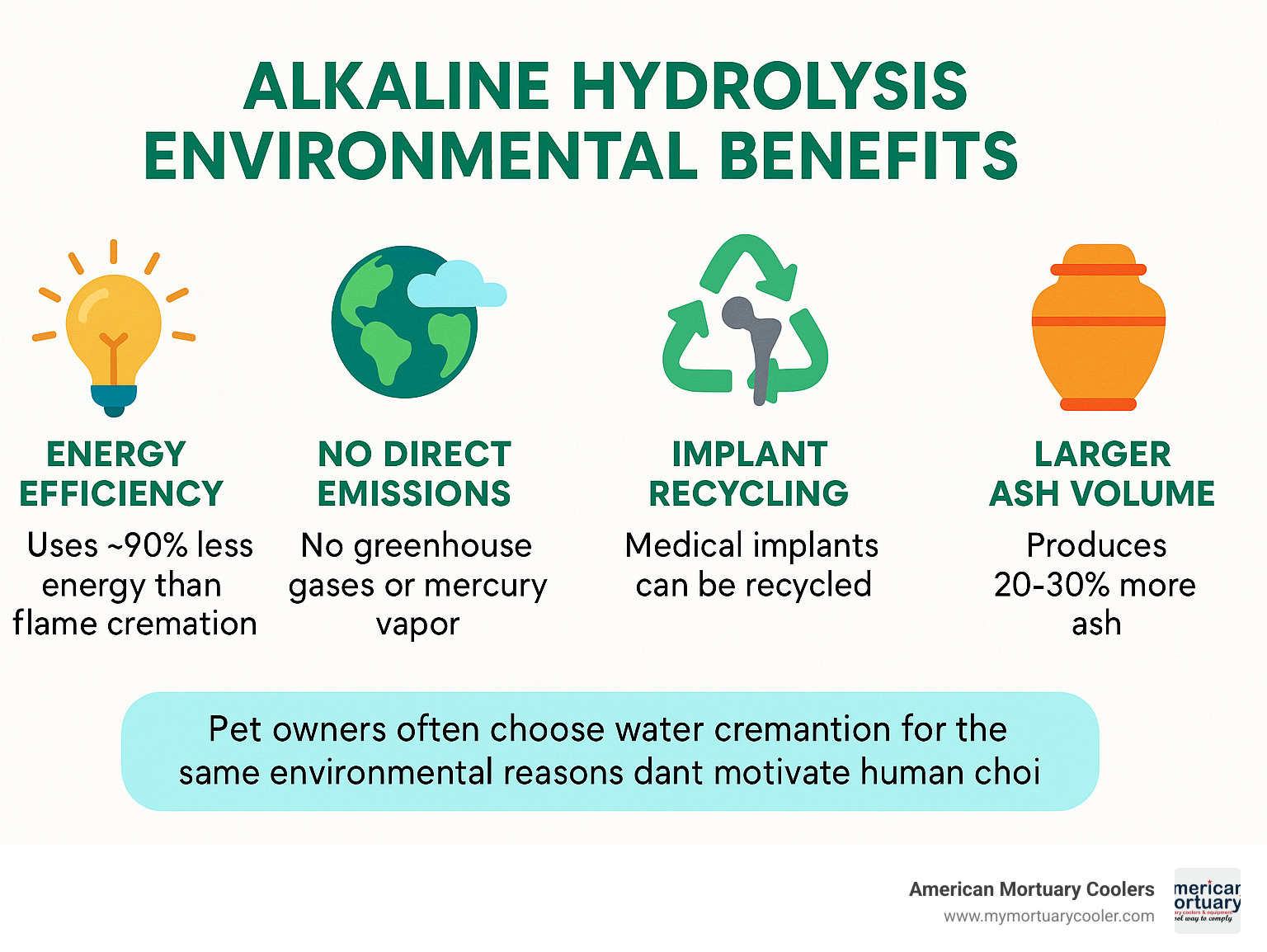
Cultural & Religious Views on "Is Water Cremation Legal in California"
While is water cremation legal in California has been answered with a clear "yes" from a regulatory standpoint, cultural and religious acceptance continues to evolve. The Catholic Church has expressed some reservations, with the California Catholic Conference initially opposing the legislation based on concerns about dignity and respect for the human body.
Protestant denominations generally haven't issued specific guidance, leaving the decision to individual conscience. Within Jewish communities, perspectives vary widely – Reform congregations may accept the practice while more traditional communities maintain a preference for burial.
"In Judaism, we have a principle called 'bal tashchit'—do not destroy or waste," shares Rabbi Sarah Goldstein of Temple Beth Shalom in Los Angeles. "Some in our community see water cremation as actually honoring this principle through its environmental benefits."
Interestingly, some Native American tribes have shown interest in aquamation, finding alignment with water-based spiritual beliefs, though practices vary considerably among different indigenous communities. Among those without strong religious affiliations, water cremation is gaining steady acceptance, particularly with environmentally conscious individuals looking to reduce their final footprint.
Other Eco-Friendly Alternatives in California
For Californians exploring green end-of-life options, water cremation represents just one path among several thoughtful alternatives. Since 2022, human composting (officially termed Natural Organic Reduction) has been legal in California under AB 351. This process transforms remains into nutrient-rich soil through controlled decomposition, typically costing between $5,000 and $7,000.
Memorial forests offer another beautiful option, with services like Better Place Forests allowing cremated remains to be placed beneath memorial trees in protected forest preserves throughout the state. Natural burial, which foregoes embalming and uses only biodegradable containers, is available at several green cemeteries across California.
For those wanting to combine memorialization with environmental protection, conservation burial occurs on land specifically protected for conservation purposes – creating a lasting environmental legacy alongside personal remembrance.
"California has really become a pioneer in offering environmentally conscious end-of-life choices," notes environmental advocate Maria Santos. "Water cremation fills an important niche, but families benefit from knowing they have multiple meaningful green options to consider."
At American Mortuary Coolers, we've seen growing interest in equipment for these eco-friendly alternatives as funeral homes across California respond to changing consumer preferences. The shift toward greener options reflects a deeper connection between how we live and how we choose to leave this world – with water cremation offering a gentle, environmentally responsible option for those asking "is water cremation legal in California?"
How the Process Differs From Flame Cremation — Step-by-Step Guide
While both water cremation and flame cremation give families the comfort of cremated remains, the journey to get there looks quite different. Understanding these differences helps families choose the option that best aligns with their values and wishes.
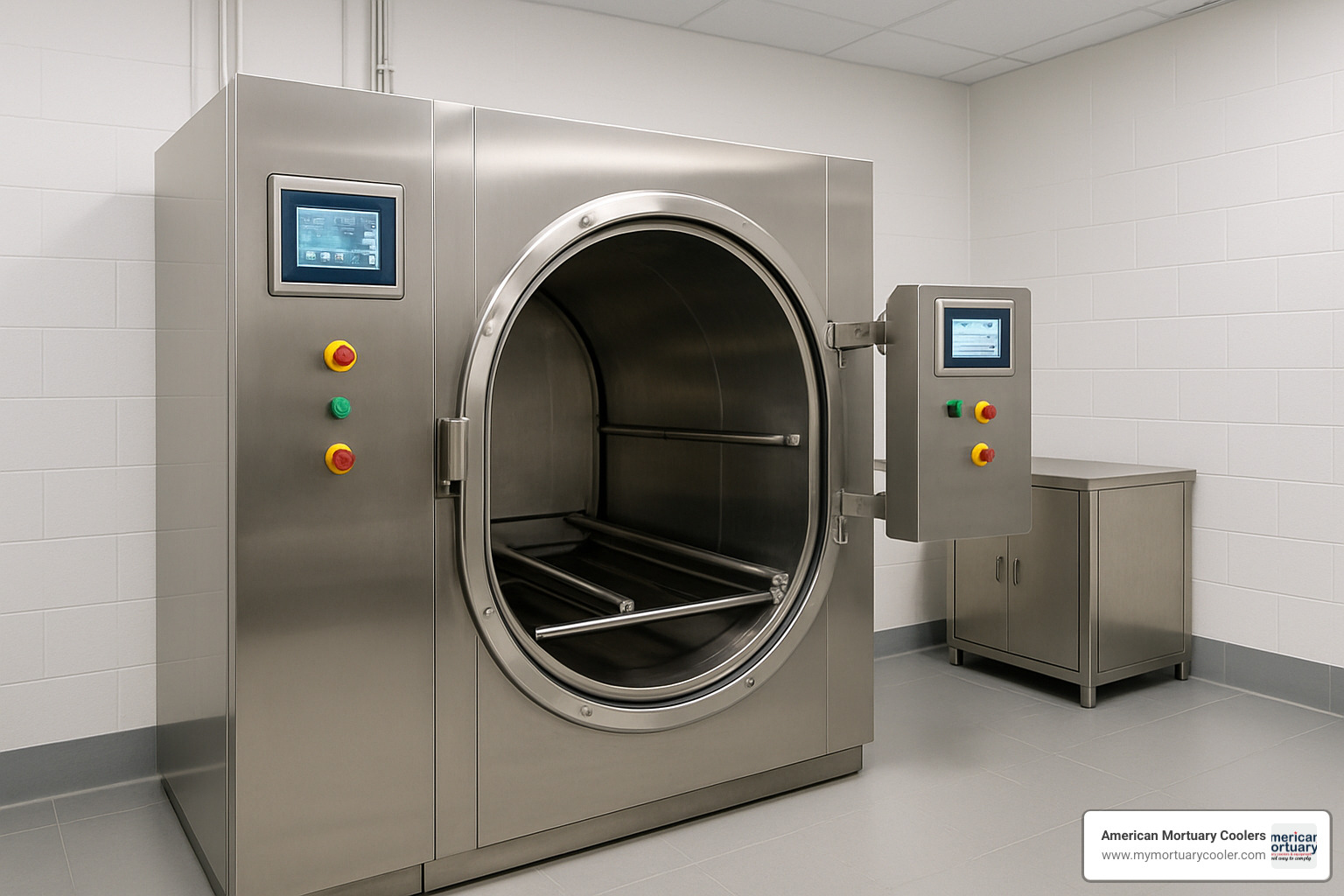
From Intake to Return of Remains
The water cremation journey begins much like traditional cremation, with careful verification of identity and paperwork. But from there, the paths diverge in meaningful ways.
With water cremation, families can take comfort knowing their loved one's pacemaker or metal implants don't need removal—a small but meaningful difference that preserves the body's integrity. Both methods require the same careful authorization from the family, ensuring your loved one's wishes are honored.
California law takes identification very seriously for both methods. Each body receives a durable identification disk that stays with them throughout the entire process. Think of it as a silent guardian, ensuring your loved one is treated with respect and never confused with another person. Detailed records track every step, noting dates, times, and the caring professionals overseeing the process.
The actual cremation process reveals the most striking differences. In water cremation, your loved one rests in a soft silk bag within a stainless steel chamber, surrounded by water and potassium hydroxide. The process takes a gentle 4-6 hours at about 160°C under pressure—a stark contrast to flame cremation's intense heat. Traditional flame cremation places the body in a combustible container inside a chamber that reaches a scorching 1,400-1,800°F, reducing the body to remains in just 1-3 hours.
"Families often appreciate knowing that water cremation is a gentler process," shares Thomas Wong, a funeral director who offers both options. "There's something comforting about water rather than fire for many people."
After either process completes, the remaining bone fragments undergo processing in a cremulator to create a consistent powder. One notable difference? Water cremation typically yields 20-30% more remains—giving families more to keep, share, or scatter as they wish. The remains also tend to be whiter in color, which some families find meaningful.
The final step—returning your loved one's remains—follows similar protocols for both methods. The cremated remains are carefully placed in your chosen urn or a temporary container, with proper documentation for release to authorized family members. From there, the same memorialization options await—whether scattering in a meaningful place, burial in a cemetery, or keeping in a special urn at home.
What Happens to the Liquid After Water Cremation?
One question many families ask when considering is water cremation legal in California is what happens to the liquid afterward. This sterile byproduct, called hydrolysate, contains amino acids, peptides, sugars, and salts—essentially the same natural compounds that would enter the soil during natural decomposition.
The alkaline hydrolysis process is remarkably thorough, effectively destroying all pathogens, prions, and DNA. What remains is a sterile solution that California facilities handle with careful attention to environmental regulations.
Most California facilities release the hydrolysate to the municipal wastewater system with proper permits from local water authorities. This approach makes sense ecologically—the nutrients return to the water cycle rather than being lost. Some facilities, with appropriate permits, may use the nutrient-rich solution as fertilizer. Others partner with specialized waste management companies for collection and treatment.
"The nutrients in hydrolysate actually benefit plant growth," explains environmental engineer Dr. Elena Rodriguez. "From an environmental perspective, we're completing a natural cycle by returning these elements to the ecosystem."
Some forward-thinking research institutions even use hydrolysate in studies exploring its benefits for soil enrichment and carbon sequestration—turning end-of-life care into a potential solution for climate challenges.
At American Mortuary Coolers, we've helped numerous California funeral homes set up water cremation systems that meet all regulatory requirements for both the cremation process and hydrolysate handling. Our equipment is designed with both dignity and environmental responsibility in mind, ensuring the entire process honors both your loved one and our shared planet.
Frequently Asked Questions About Is Water Cremation Legal in California
How long does the licensing process take for a new hydrolysis facility?
If you're planning to open a water cremation facility in California, be prepared for a journey—not a sprint. The licensing process typically takes 6-12 months from start to finish, and it's a bit like planning a cross-country road trip with multiple stops along the way.
Your itinerary will include visits to the Cemetery and Funeral Bureau, local water authorities, and sometimes air quality management districts. Most families I work with find that the environmental permits and local zoning approvals take the longest, as you'll need to demonstrate that your wastewater discharge plans meet all regulations.
"We learned this lesson the hard way," shares James Wilson, a regulatory consultant I've collaborated with on several facility setups. "I always tell funeral homes to begin the licensing process at least a year before they hope to offer water cremation services. This gives you breathing room when the inevitable paperwork hiccups occur."
Can families witness an aquamation in California?
Is water cremation legal in California to witness? Yes, but with some important considerations.
California law requires every hydrolysis facility to clearly disclose in writing whether viewing is permitted. In practice, whether families can witness the process depends entirely on the facility's equipment and policies.
Some of the newer hydrolysis chambers feature viewing windows or video monitoring systems—similar to how some crematoriums allow viewing of flame cremation. However, many facilities simply don't have the equipment design or space to accommodate this option.
I recently spoke with Sarah Johnson, a funeral director who's been offering aquamation for three years. She explained her approach: "When families ask about witnessing, I tell them the process is gentle but takes several hours—not exactly riveting viewing. Instead, we offer meaningful alternatives like a ceremonial placement of the body in the chamber before we begin, or gathering when we remove the remains afterward. Most families find these moments more meaningful anyway."
What permits are needed to scatter hydrolyzed remains at sea?
If you're planning to scatter your loved one's hydrolyzed remains at sea in California, you'll need the same permits as for traditionally cremated remains. The ocean doesn't distinguish between the two, and neither does the state.
First, you'll need a disposition permit from the local registrar in the county where the death or aquamation occurred. If you're using a commercial scattering service (which many families find easier), they should already have a Cremated Remains Disposer registration from the Cemetery and Funeral Bureau.
The maritime requirements are straightforward but important: scattering must happen at least 500 yards from shore. The remains need to be removed from non-biodegradable containers unless you're using a special scattering urn designed to dissolve within 4 hours.
One timing note that catches some families by surprise: California law requires scattering within 60 days of receiving the remains. If you need more time, you'll need to provide a written explanation to the person with the right to control disposition.
Captain Michael Chen from Pacific Memorial Services, who partners with several of our equipment clients, puts it beautifully: "Many families turn the scattering into a meaningful memorial boat trip. We handle all the permits and paperwork so they can focus on the moment itself. There's something deeply healing about returning to shore knowing your loved one is part of something vast and eternal."
If you're considering is water cremation legal in California for your loved one and have more questions about the scattering process, our team at American Mortuary Coolers can connect you with experienced providers who steer these waters daily.
Conclusion & Next Steps
So, is water cremation legal in California? Absolutely. Since 2020, this gentle, eco-friendly option has been available to California families looking to reduce their final environmental impact. The comprehensive framework established by AB 967 ensures water cremation facilities operate with respect for both our planet and the dignity of your loved ones.
I've seen how many families find peace in choosing a disposition method that aligns with their environmental values. While water cremation does cost more than traditional flame cremation, many people tell me the environmental benefits make the difference worthwhile – like planting a tree instead of adding to pollution with their final act.
Here at American Mortuary Coolers, we work closely with funeral homes throughout California who are adding water cremation to their services. Our equipment specialists understand the unique challenges of meeting California's regulations, and we're proud to support funeral directors with durable, custom-designed equipment that meets these exacting standards.
If you're considering water cremation for yourself or someone you love, I recommend starting with these simple steps:
Look through our provider list above to find services in your area of California, then compare packages and pricing (remembering that costs vary significantly between providers). Don't hesitate to ask detailed questions about their environmental practices, especially regarding hydrolysate disposal. And if religious or cultural considerations matter to your family, discuss these openly with your chosen provider.
For funeral directors reading this, we'd love to help you expand your offerings to include this increasingly requested service. From our strategic locations across the country, we provide direct delivery of quality equipment designed specifically to meet California's requirements. Our team can walk you through the specifications you'll need and help identify solutions custom to your unique facility.
Water cremation represents a thoughtful evolution in how we say goodbye – one that connects modern technology with growing environmental awareness. As California continues leading the way in green funeral alternatives, we're here to support this transition with reliable equipment and genuine expertise.
Whether you're planning ahead for yourself or making arrangements for a loved one, I hope this guide has helped answer your questions about water cremation in California. If you need more information about aquamation equipment or supplies, we're always here to help.



